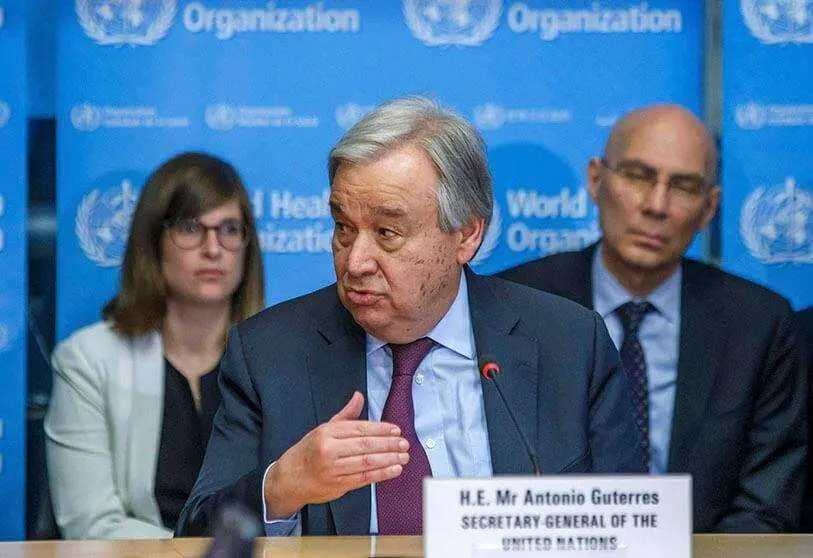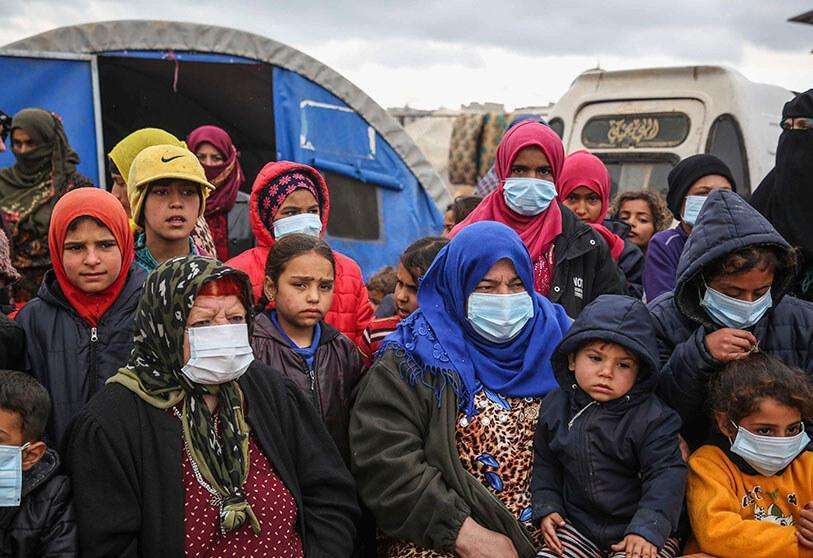The UN and the Middle East: in health and in disease

The Arab-Israeli conflict was his first mission, which is still unresolved; Iraq, a wake-up call; and Syria, a new questioning that does not go beyond. "The Middle East is the space where the UN tried to understand itself, to put its principles and its charter into practice", sums up Efe Karim Maqdisi, professor at the American University of Beirut and author of "Cascos Azules. United Nations and the Arab World", a chronological compilation of how this region has been forced into a constant "reconceptualisation".
Today the blue and white UN flag, the 4x4s with the English acronym (UN) and the military observers are spread out over the buildings, streets and borders of this convulsed land and reflect an omnipresence that is as valued as it is rejected.
From the outset, their involvement in the area has been full of light and shadow, particularly owing to the action and inaction of a Security Council that has prevented the necessary adaptation of humanitarian or peacemaking instruments that contain the volatility of a context with a strong geopolitical charge.
The British Mandate's plan for the partition of Palestine, approved by the General Assembly in 1947, was rejected by the Arabs and erupted into a major conflict that has implications to this day.
"It is in the Arab-Israeli arena that the UN develops its main instruments of peacekeeping. It was the first place where a mediator was sent, the first observation mission, the first peacekeeping mission, UNTSO, which still exists, and the first specialised agency, UNRWA (agency for Palestinian refugees), the largest of the UN," José Vericat, regional director of the Carter Center, explains to Efe.
The first major decisions of the General Assembly were devoted to this conflict and from this scenario the UN gradually reacted ad hoc and shaped its structure, which was not always provided for in its founding charter.
In 1948, the Swedish diplomat Folke Bernadotte was the first United Nations mediator and was sent to Jerusalem. There he was assassinated a few months later, a prelude to the difficulties the organisation would encounter in the following years. The many mechanisms, instruments, bodies and modus operandi used and employed by the organisation around the world are ramifications of this eternal conflict, especially in peacebuilding.

At UNTSO (United Nations Truce Supervision Organisation), staff were trained and then travelled to other hot spots, and here a form of intervention was developed that has been replicated around the world: the sending of multinational troops to the field with a specific mandate.
UNRWA plays an important role in defending the rights of Palestinian refugees and has also been key to keeping their cause alive for decades. In the Middle East, "the UN is as much involved in creating the problem as it is in trying to find a solution", Vericat states.
Since the attack on the United Nations headquarters in Baghdad in 2003, the organisation's buildings have had to be equipped with fences, guards and national armies, as is the case in Lebanon, Maqdisi illustrates.
"This symbolises the change that has taken place, especially in the aftermath of 2003, in the way political insecurity is perceived. The UN representative in Baghdad, Sergio Vieira de Mello, was killed in that attack while the UN buildings were still relatively exposed.
Although the UN did not approve of the US-led invasion of Iraq, its intervention practically the day after the end of the war was declared led a large part of the population to perceive it as an ally of the US occupation.
This loss of legitimacy began, according to Maqdisi, with the imposition of severe sanctions on Iraq in the 1990s, following the invasion of Kuwait, which were approved by the Security Council and had hitherto been applied only partially in other countries but in the case of Iraq exceeded the humanitarian limits for many. "It generated a lot of criticism and then had to be adapted to a better or more humane version of this type of sanctions," he explains.
In this way, he situates Iraq as another important area of how, after the Cold War, the UN developed, both with sanctions and in the humanitarian response towards refugees.
The agency for refugees (UNHCR) played an important role that recently brought a new challenge to Syria, including the displacement of people due to the atrocities of the Islamic State (IS), which forced it to address the biggest refugee crisis since the Second World War.
The Arab revolts that began in 2011 once again shook the region and the organisations working in it. The Syrian conflict generated a massive flow of refugees to which everyone looked to the UNHCR, legitimised by the management in Iraq, to react to a crisis of similar dimensions. But it opened up other questions.
"There were a number of UN agencies that by their nature had to deal with the government (of Bachar Al Asad) for the distribution of food or aid. The criticism was that the UN was legitimising the government (accused of repression) and many demanded alternative routes," Maqdisi recalls.
Thus, Syria became another "battleground of how the UN was going to reconceptualize itself", avoiding the government in favor of the support of the people, civil society. The debate at that time seemed to end up in the "traditional role" of the UN to collaborate with existing governments regardless of their legitimacy.
The discussion is not closed and the recent crisis in Lebanon due to the explosion in the port of Beirut has brought back the demand for bypassing corrupt governments and diverting aid directly to society. "I think that many in the Security Council did not want to (rethink) it. There is not enough interest, and that includes the US, Russia and China (with veto power)," Maqsidi explains about the agency's limitations in redefining itself.

The members of the Security Council have strong national interests in the Middle East, where all its members, except China, have historical ties. This body could have done more in the area but, time and again, it has been conditioned by the vetoes-or possibility of vetoing-of its resolutions. The United States stands out for its steadfast defence of Israel's positions, as it has vetoed up to 40 resolutions.
The polarisation within the Council has left it lacking in action and has led the Arab states to resort increasingly to the General Assembly and other UN institutions (such as the Human Rights Council), with the risk that these will be "colonised" by the conflict and its ramifications.
The Middle East, and more so the Israeli-Palestinian conflict, has highlighted one of the organisation's serious problems: its inability to enforce its own resolutions, both those of the Council (binding) and those of the Assembly (non-binding)
One of the first examples is Resolution 181, which gave the green light to the partition, only partially completed 73 years later and many of whose mandates were forgotten (Corpus Separatum of Jerusalem, borders, etc). And, since Resolution 181, it adds up and continues.
The peacekeepers in the region, for their part, have made valuable contributions, largely by allowing the parties to ease tension by saving face. One shortcoming that has become apparent is that it has been prolonged over time. Today the UN recognises that peace missions must have an exit strategy from the outset in order not to become part of the landscape, as has occurred in the Middle East.
Another interesting debate is the criticism of those who consider that the UN can contribute to freezing a conflict, keeping it unsolvable. As military violence disappears and humanitarian needs are met, the parties involved may lose the motivation to make concessions for a more lasting peace.
Lieutenant Colonel Jonathan Conricus, who is currently the spokesman for the Israeli army and was the first Israeli soldier assigned to the UN peacekeepers' assessment centre, acknowledges that the mandate of these forces is imperfect, but stresses that they have positive powers as a mechanism for liaison and disagreement and that they help the parties to de-escalate situations. A fundamental effect, because "the reality on the ground is not reflected in the reports" of the Security Council.
The proper functioning of a mission does not guarantee the success of the final objective. As UNTSO spokesperson Judy Hylton stresses to Efe, "peacekeeping cannot work if there are divisions in the Security Council and among the key actors who influence the parties to obey agreements. Fixing this is beyond our capacity. The fact that, 74 years later, the Israeli-Palestinian conflict still exists is a painful and stark reminder of its failures.








